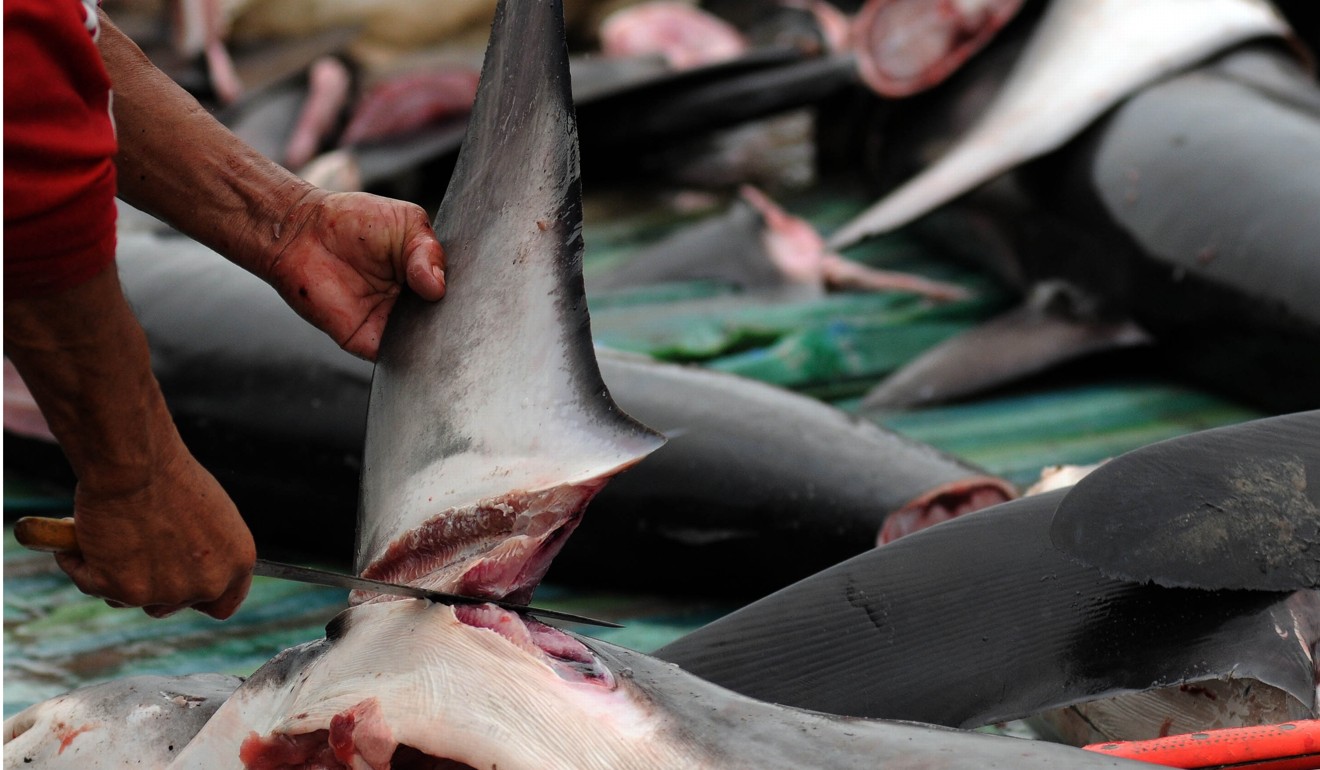Where battle to curb shark fin consumption is being won and lost, and why trade has to stop – new research
Young consumers in China and Hong Kong are turning away from shark fin, but overseas Chinese are eating more, report finds. The only way to save oceans’ apex predator is to stop eating and trading in fins now, researchers say

Though waning in Hong Kong, the appetite for shark fin soup is still strong among overseas Chinese communities. A new report has now put out an urgent call; the trade and consumption of shark fin must stop immediately, it warns. Demand for the product from wealthy consumers is largely responsible for reducing populations of some species such as hammerhead and oceanic whitetip sharks by more than 90 per cent, it says.
Researchers from the University of Hong Kong, the Sea Around Us initiative at the University of British Columbia and environmental group WildAid Hong Kong, found that annual shark catch levels had more than doubled to 1.4 million tonnes since 1960.
The findings were published last week in Marine Policy, a leading journal of ocean policy studies.
Over-exploitation is “threatening almost 60 per cent of shark species, the highest proportion among all vertebrate groups”, says Yvonne Sadovy, lead author of the study and professor at the School of Biological Sciences at the University of Hong Kong.
The fin is the main ingredient of shark fin soup, a dish considered a delicacy among Chinese both in China and abroad. It’s a popular dish at banquets, Lunar New Year celebrations and high-end restaurants.

“The exclusiveness linked to the product combined with its limited natural supply increases its price and makes it an attractive trading good for business networks, particularly for those with shady or illegal practices,” says Sadovy.
The study highlights both legal and illegal fisheries and the difficulties in enforcing sustainable fishing practices. It says 25,000 tonnes of dried shark fins come from unsustainable and illegal fisheries, while only 4,300 tonnes of dried shark fins are produced sustainably every year.

“The global shark fin industry is rife with criminal activity and cannot be trusted to police itself effectively,” says study co-author Alex Hofford, wildlife campaigner for WildAid in Hong Kong. “Around a quarter of all shark species are hurtling towards extinction. As our paper clearly shows, the only way to protect sharks is to halt the consumption and trade in all shark fin.”
Just last week eight tonnes of shark fin worth US$6.2 million en route to China and Hong Kong was confiscated in India.
Hofford says Hong Kong’s irresponsible restaurant sector should stop selling and serving shark fin immediately.

In January, a survey by Hong Kong Shark Foundation found 85 per cent of 300 Lunar New Year banquet menus from Chinese restaurants in the city had shark fin dishes.
Hong Kong’s consumption of shark fins is down due to awareness and its shark fin imports have halved since 2007, thanks to tighter regulations and shipping bans. But the city is still the entry point for about half of all globally traded dried shark fins, importing around 6,000 tonnes per year in recent years, where many are re-exported to China.
The study published in Marine Policy also found that rising demand for shark fin among an expanding middle class in less economically developed places such as Vietnam, and Indonesia where unsustainable fishing practices exist.
Pressure is particularly high in Indonesia, where annual catches exceed 100,000 tonnes of shark a year. India, Spain and Taiwan also play an important role in the catching of sharks and the subsequent sale of their fins in international markets, particularly in Hong Kong. Thailand has been the top exporter of shark fins since 2016.
“Shark finning and the mixing of catches tend to take place in the open seas or in remote ports, where there is little to no oversight,” says study co-author Daniel Pauly, principal investigator with Sea Around Us at University of British Columbia.
Pauly says the problem is heightened by a lack of interest from authorities in controlling illegal wildlife trade, including that in shark fins: “They also have limited enforcement capabilities, with authorities unable to conduct DNA tests of every fin that arrives via customs to determine where the shark was caught or to determine the species.”

Pauly says consumers must decide what is acceptable and what is not when it comes to vulnerable and controlled species.
“Traditions change all the time according to new knowledge and shifting values. So while the appetite for shark fin soup is growing in places like Thailand and Macau, it is slowly declining in Hong Kong and China, where young people are starting to see it as a cultural practice that is worth abandoning,” Pauly says.